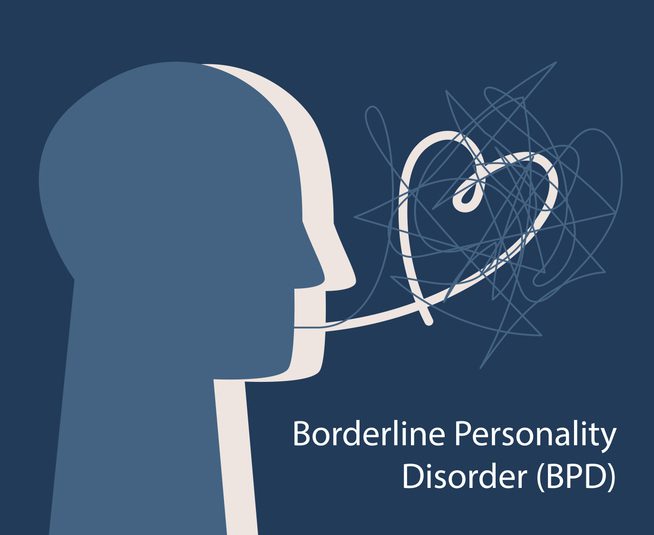Borderline personality disorder (BPD) is a complex mental health condition characterized by a pervasive pattern of varying moods, self-image, and behavior. Individuals with borderline personality disorder may struggle with unstable relationships, self-image issues, impulsivity, and intense emotional fluctuations. The following is a simple overview of this complicated disorder.
The Basics of Borderline Personality Disorder
Borderline personality disorder often results in difficulty maintaining relationships and a distorted self-perception, making daily interactions and personal progress challenging. Individuals with BPD typically face significant emotional instability, swinging rapidly from intense happiness to deep despair. Such mood swings contribute to impulsivity, leading to actions that can have serious consequences on personal relationships and feelings of loss of self-worth.
A main characteristic of this disorder is a persistent fear of abandonment, which can trigger efforts to avoid real or imagined separation or rejection. This fear often leads to difficulty trusting others, even in close relationships. Individuals with BPD may also experience strong episodes of anxiety, depression, and anger lasting hours or days. Their inability to regulate their emotions can cause relationship turmoil and a clouded sense of identity.
Four Subtypes of Borderline Personality Disorder
There are four categories of borderline personality disorder: discouraged, impulsive, petulant, and self-destructive. A person can suffer from more than one type of borderline personality disorder at the same time or at different times in their life. Although the subtypes of BPD can vastly overlap, certain symptoms, such as aggressiveness and anger, may vary significantly. There are also people with BPD whose condition does not fall into any of the four categories.
- Discouraged Borderline Personality Disorder
People suffering from discouraged borderline personality disorder are often referred to as high-functioning, successful, or quiet. They may be perfectionists. Discouraged BPD is characterized by noticeable dependency on others, passive-aggressiveness, depressive moods, and feelings of powerlessness. Individuals generally show a unique combination of dependence on and avoidance of others. People with this type may show clinginess, neediness, and fear of abandonment. It is difficult for them to express anger because it goes against their self-image, resulting in self-destructive behavior and suicidal ideation.
- Impulsive Borderline Personality Disorder
Individuals diagnosed with impulsive borderline personality disorder may appear charismatic, energetic, flirtatious, elusive, or detached. They are often engaging or motivating. This type of BPD is characterized by highly impulsive behaviors, thrill-seeking, and risk-taking without much consideration for consequences or other people. Individuals with this type may have trouble with substance abuse and can exhibit dangerous, aggressive, or self-destructive behaviors. Their actions are often aimed at seeking instant gratification or avoiding discomfort.
Examples of these types of behaviors include:
- Binging behaviors such as binge eating, overspending, binge-watching
- Aggressive behaviors such as outbursts, yelling fits, physical fights, hitting or breaking things
- Risky and self-destructive behaviors such as having unprotected sex or multiple sex partners, using illicit drugs, consuming excessive amounts of alcohol, driving under the influence, gambling
- Petulant Borderline Personality Disorder
People suffering from petulant BPD are often unpredictable, irritable, impatient, and prone to outbursts of anger or acting out. Their emotions can change from sulkiness or sadness to anger very quickly. They can be stubborn but also show signs of feeling unworthy or fear of being unloved. This contradiction often results in mood swings and difficulty in interpersonal relationships. Individuals with petulant BPD are reluctant to admit they did anything wrong and often behave in a passive-aggressive way.
- Self-destructive Borderline Personality Disorder
Individuals with self-destructive BPD struggle with an underlying sense of self-hatred or a belief that they deserve punishment. They have self harming behaviors such as cutting, scratching, burning, or hitting. People in this subtype might engage in risky behaviors to get a rush of adrenaline without any regard for their well-being. They may abuse alcohol, illicit drugs, or prescription medication, have an eating disorder, or threaten or attempt suicide as a way of coping with deep feelings of self-loathing and emptiness.
Although the symptoms of self-destructive borderline personality disorder are similar to other subtypes of BPD, three additional symptoms help clarify the subtype:
- Euphoria
- Increased energy
- Decreased sleep
We Can Help
If you or a loved one suffers from borderline personality disorder, we can help. At Canyon Vista Recovery Center in Mesa, Arizona, we offer mental health treatment for individuals who struggle with borderline personality disorder, depression, bipolar disorder, anxiety disorders, substance use disorder, and co-occurring disorders. Contact us today to find out how we can help.





